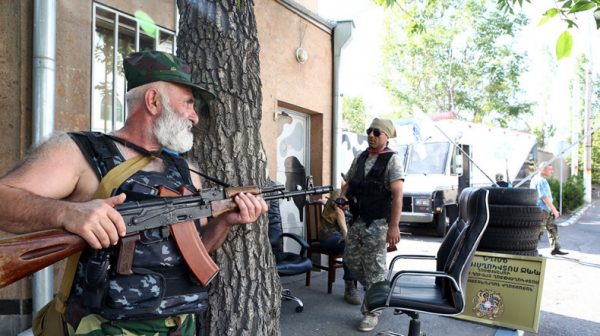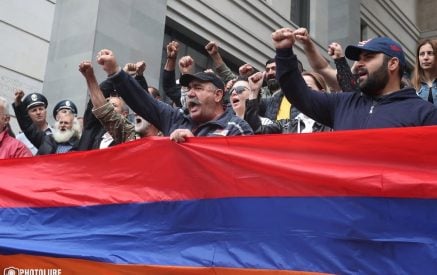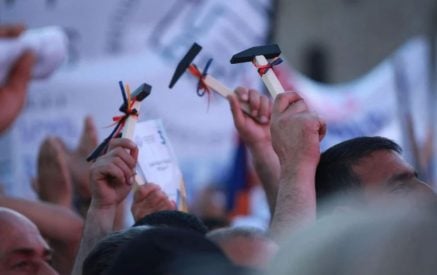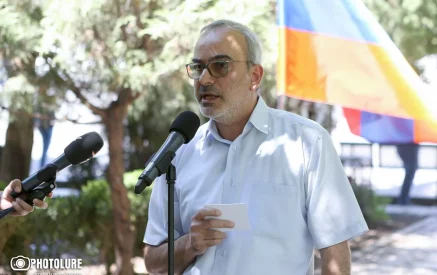Who is Jirair Sefilian
Jirair Sefilian, Lebanese-born Armenian, is a Karabakh War hero and a political activist, who has been the Commander of the Special Batallion of Shushi in the 1992-94 Karabakh war, playing significant role in the liberation of the city of Shushi.
Sefilian has played various roles in the political life in Armenia since the war, mostly holding radical positions in the domestic political life, as well as the Nagorno Karabakh peace process, diametrically different from the main opposition and ruling parties in the country.
As phrased by the RFE/RL, since the war, “Sefilian has used his war-hero status to gain an audience for his belief that Armenia is plagued by inept leadership and corruption and in need of urgent rescue”.
Read also
Where do the Sasna Tsrer come from?
Named after an Armenian heroic epic poem, included in UNESCO Intangible Cultural Heritage list in 2012, the Sasna Tsrer, or Daredevils of Sassoun armed group is an outgrowth of the “New Armenia” Public Salvation Front comprised of the Heritage Party members, Founding Parliament initiative “Stand up, Armenia” citizens’ movement and active members of other initiatives, including environmental movements, that have been evolving in Armenia in the past few years. The other two predecessors of this movements have been Pre-Parliament, established in 2012, and Sardarapat Movement, launched by Jirair Sefilian years before.
In all its incarnations, this movement alleged that “It is possible to overcome the crisis only through radical transformation of the current political system”, as phrased in Pre-Parliament declaration in 2012.
Along with transformations of this movement, it has nevertheless remained outside of the current political system. The figurehead of the group, little known political activist Andrias Ghukasian gained more public recognition as he chose hunger-strike — with a little camp and poster “Stop Fake Elections” set in front the National Academy of Sciences’ building — as a means of his campaign during presidential race in 2013.
Ghukasian got 0,57% of votes in 2013, and never recognised the official results of the elections.
The Public Salvation Front, which included two former presidential candidates – opposition frontrunner Raffi Hovhannisian and Andias Ghukasian — has been established in Fall 2015 as an opposition platform to campaign against the proposed Constitutional Amendments.
Views on the government, political system and Nagorno Karabakh peace process
At the inaugural meeting of the Public Salvation Front, Armen Martirosyan, a former member of National Assembly and incumbent member of the Yerevan City Council, declared that “the Front plans to mobilise the people and through various actions of civil disobedience remove [incumbent President] Serzh Sargsyan”.
The public rallies of Founding Parliament members attracted less than few dozens of symphatisers in the public squares.
The movement has been rejecting the possibility of achieving changes in the country through any elections. While in domestic politics the group claimed the necessity of top-down revolution, in foreign policy matters they alleged Serzh Sargsyan and the government are mishandling the Nagorno Karabakh peace process, which in their opinion should only be about “reunification” of Armenia and Nagorno Karabakh under the same flag.
This position did not echo the standing of any other formal political grouping across the political spectrum.
Who is the leader of the “Daredevils of Sassoun”
The armed attack on the police station in Erebuni district of Yerevan came around a month after the arrest of Jirair Sefilian and six other members of Founding Parliament on June 20, after the traffic police unveiled illegal arms and weaponry in a car involved in traffic accident in Yerevan. The criminal invesigation bodies claimed shortly thereafter that the weapons had connection with Sefilian, who was charged in Court and put in prison waiting for trial.
Sefilian, imprisoned on two other episodes in 2007 and 2015, including for charges of illegal arms possession and plotting mass disobedience movements, has been in prison througout the recent armed standoff in Erebuni.
He addressed his supporters from the prison at various stages, in written statements or though intermediaries.
Varuzhan Avetisian, a retired army colonel, who worked in the system of Ministry of Defense for several years before becoming an active opposition figure, became the spokesperson and formal leader of the Daredevils in the police station.
Out of 31 members of the armed group, around dozen have been acclaimed heroes of Nagorno Karabakh war, including Pavel Manukyan and Arayik Khandoyan (nicknamed Lone Wolf), also known “Armenian Che Guevara” for a famous battlefield portrait during the 1990s.
The group also included few members, who, according to some unverified information, were dragged into the operation without their deliberate consent.
Following Sefilian’s arrest on June 20, the Daredevils held a press conference on July 4 and alleged an armed rebellion in the country should the liberated territories be returned to Azerbaijan.
https://www.youtube.com/watch?v=op17Q4Dj6FQ
The authorities did not respond to this statement.
What did the Daredevils demand
s verified later, 31 members of the armed group, calling themselves after an Armenian epic poem, Sasna Tsrer, or Daredevils of Sassoun, in the early morning hours of July 17 attacked a police station in Erebuni district in Yerevan seizing control over the unit and taking hostages, including Yerevan’s deputy police chief Valery Osipyan and national deputy police chief Vardan Yeghiazaryan.
Colonel Arthur Vanoyan from the police unit was killed in the shootout.
Over the following days, as negotiations dragged on, the hostages were released, including at the request of Jirair Sefilian – relayed to the gunmen through intermediaries from his detention facility.
The early demands of the “Daredevils of Sassoun” were aired in amateur footage by a member of the group on July 17, and then repeated on record with Nikol Pashinian – a prominent opposition figure – who entered the premises of the seized police station later same day.
The armed group demanded the release of Jirair Sefilian, as well as the unconditional release of other detained people who they see as “political prisoners”, as well as a harder line in Nagorno Karabakh peace process with outright rejection of any territorial concessions to Azerbaijan.
Over time, the demands of the group also included the resignation of President Serzh Sargsyan, forming a temporary bodies of governance in the country and other systematic changes.
How did the government respond
The early reaction of the authorities was mild, allegedly allowing for negotiation settlement to take root.
“Negotiations are being conducted with the armed individuals with the aim of organizing their surrender to the Armenian authorities,” the National Security Service said in an early statement.
However, the tone of the government changed over time, as demonstrations and public unrest grew in the city.
Left without leaders capable to handle the mass rallies, the public became disoriented and resorted to various provocations and direct clashes with the law enforcement agencies at the site of special police operation in Erebuni and adjacent Sari Tagh district, claiming to get to the seized police station and “greet the rebels”.
Police spokesperson Ashot Aharonyan made a written statement on July 25, signalling the hardening of positions.
“Today a call with the following content was made available to those in the [Erebuni] police station… All members of the armed group are once again urged to act reasonably and duly consider the circumstances mentioned above to lay down arms voluntarily and surrender to the authorities. You still have time for that”.
In the leaflet the National Security Service notified the members of the armed group still in the police station in Erebuni district of Yerevan since July 17 of their criminal acts, including hostage taking, seizing buildings, etc, with references to the articles in the Criminal Code.
“On July 26 the National Security Service, both in writing and verbally, numerously warned the armed group that seized the police station to stop the continuous criminal activities immediately, in particular, including shootings and getting out of the territory of the police station in arms”, – the National Security Service of Armenia said in another written statement on July 27. The statement also included three taped audio recordings of phone conversations of certain members of the armed group with unidentified persons from outside the station.
“Moreover, some members of the group, abusing the willingness of the government to provide for medical care to those wounded, took hostage four medical workers in the morning of July 27”, – the NSS statement of July 27 said.
“Time is running out”, – the NSS claimed.
Leaderless revolution?
Few political parties tried to capitalise on the mass rally, but none succeeded.
Nikol Pashinyan, a staunch critic of the government, famous for his inflammatory speeches in the National Assembly, tried to manage the rally and streamline the demands of the demonstrators few times.
However, the members of Founding Parliament, as well as the Daredevils, denied his legitimacy in doing so, and Pashinian stood back.
Vartan Oskanian, a former Foreign Minister in 1998-2008, and the chairman of the newly established “Unity” political party, also came to the scene to offer leadership, yet the public did not seem happy about it either.
Vitaliy Balasanyan, Karabakh war hero and incumbent member of Nagorno Karabakh National Assembly, acted as most efficient mediator between the armed group and the authorities.
Various members of the Founding Parliament, including a former ASALA member Alex Yenigomshian, Andrias Ghukasian, David Sanasaryan, as well as new symphatisers of the Daredevils – journalist and acclaimed human rights activist Levon Barseghyan, MP Zaruhi Postanjyan from Heritage Party, former Supreme Soviet member Albert Baghdasaryan, Paruyr Hayrikyan, spoke to the people at various stages, yet noone claimed leadership, but pointed at “people must decide” populist motto.
The leaders of the public unrest, including Andrias Ghukasian, Alex Yenigomshian, Armen Martirosyan and few others were detained on charges of “organising mass unrest”.
Terrorists, gunmen, armed opposition or what?
Since the beginning of the standoof, the Daredevils allegedly exchanged fire with the police officers guarding the zone around the perimeter throughout the standoff. Several police cars and equipment were set on fire.
As the people supporting the peaceful resolution of the crisis with the armed group gathered near the police station, tensions grew higher and certain provocations from among the demonstrators led to clashes with the police, one of the most violent taking place on July 20.
https://www.youtube.com/watch?v=3l6xswg7tD0
President Serzh Sargsyan held a meeting with the heads of national security service, police, attorney and investigative bodies on July 22.
“Before we begin our next meeting let’s reinstate once again that our country has been living through difficult and decisive moments these days. I will of course not address the reasons at this stage. It’s not the good time for that now. I will just say that we all need to draw our lessons from this”, – the President said.
Ever since, the government bodies and few political figures that were actively commenting on the developments came up with more restrained statements, stopping short of labeling the seizing of police station and hostages as “terrorists”.
However, the concluding NSS statement of late July 31 said that armed group committed an act of terrorism.
“The anti-terrorist operation to restore control over the seized police station, that took place on July 30-31, is now over. Twenty terrorists have been arrested. The control over the territory of the seized police station has been restored”, – the National Security Service press statement said.
The attack on journalists on July 29
One of the most questionable episodes of the two-week standoff, has been the attack on journalists in Sari Tagh neighborhood on July 29.
The motives of the leaders of the demonstration for departing from the main group of protesters and moving to Sari Tagh – in immediate vicinity of seized police station – still remain unclear.
A number of reporting journalists, including the Panorama.am cameraman, three RFE/RL journalists, Life.ru cameraman and others suffered attacks by a large group of plainclothes men in Sari Tagh.
RFE/RL President Thomas Kent strongly condemned the attack. “Radio Free Europe/Radio Liberty is outraged by this attack on journalists carrying out their professional duty,” Kent said.
According to preliminary data, 60 people with different injuries have been submitted to 5 different medical facilities, as a result of the events at Khorenatsi Str. and Sari Tagh neighbourhood, spokesperson of the RA Ministry of Health, Anahit Haytayan wrote on her Facebook page.
A 17-year-old teenager — Sayat Harutyunyan — lost an eye in unverified circumstances, adding on the outrage of the public.
“A criminal investigation shall be initiated without further delay against those police officers who inflicted injuries upon citizens in Sari Tagh area [in Yerevan]”, – Arman Tatoyan, the Human Rights Defender of Armenia, said in a statement following these events. The Ombudsman also demanded that those police officers, irrelevant of their outfit [last night], suspected in such acts should be relieved of their duties until all the circumstances of the case are revealed.
The Office of the Prosecutor General was quick in formal reaction. “A criminal case has been launched to invesitgate the aforementioned brutality against the journalists on the basis of Article 164 of the Criminal Code (impeding the lawful professional activities of journalists). The materials of the criminal cases have been delivered to the Special Investigation Service”, – the official statement read.
The endgame: Daredevils surrender, public remains disoriented
One of the possible game-changers has been the killing of police officer Yura Tepanosyan – allegedly by a sniper from the area of seized police station in the morning of July 30.
The Police disseminated a footage of the incident.
Immediately after the published materials and footage activists in social networks started questioning the validity of the pictures, claiming the shades and other parameters of the pictures “might have been doctored”.
Since the morning of July 31 statements from Jirair Sefilian, the Daredevils, Albert Baghdasaryan came to signal that rebels are considering a surrender.
Varuzhan Avetisian reached out to local media in the morning of July 31 and claimed the police officer Tepanosyan was not killed by the armed group.
Closer to the evening the news of surrender and peaceful resolution of the standoff leaked to the media. As part of the agreement, two media outlets – RFE/RL Armenian Service and 1in.am local media — were invited to provide livestream of the process. The RFE/RL refused to participate from the site, citing security considerations and disapproval from the management.
The Police disseminated the footage of the surrender at the site of seized police station, mediated by the Karabakh War hero, member of the National Assembly of Nagorno Karabakh Republic Vitaliy Balasanyan.
One of the leaders of the Daredevils, Varuzhan Avetisian, said before his surrender that they decided to surrender to authorities and continue their struggle “as POWs”, referring to their rejection of the legitimacy to the authorities.
What next?
According to Armenian national legislation, criminal investigation is now expected to take off, as members of the armed group were taken over by security service on July 31.























































